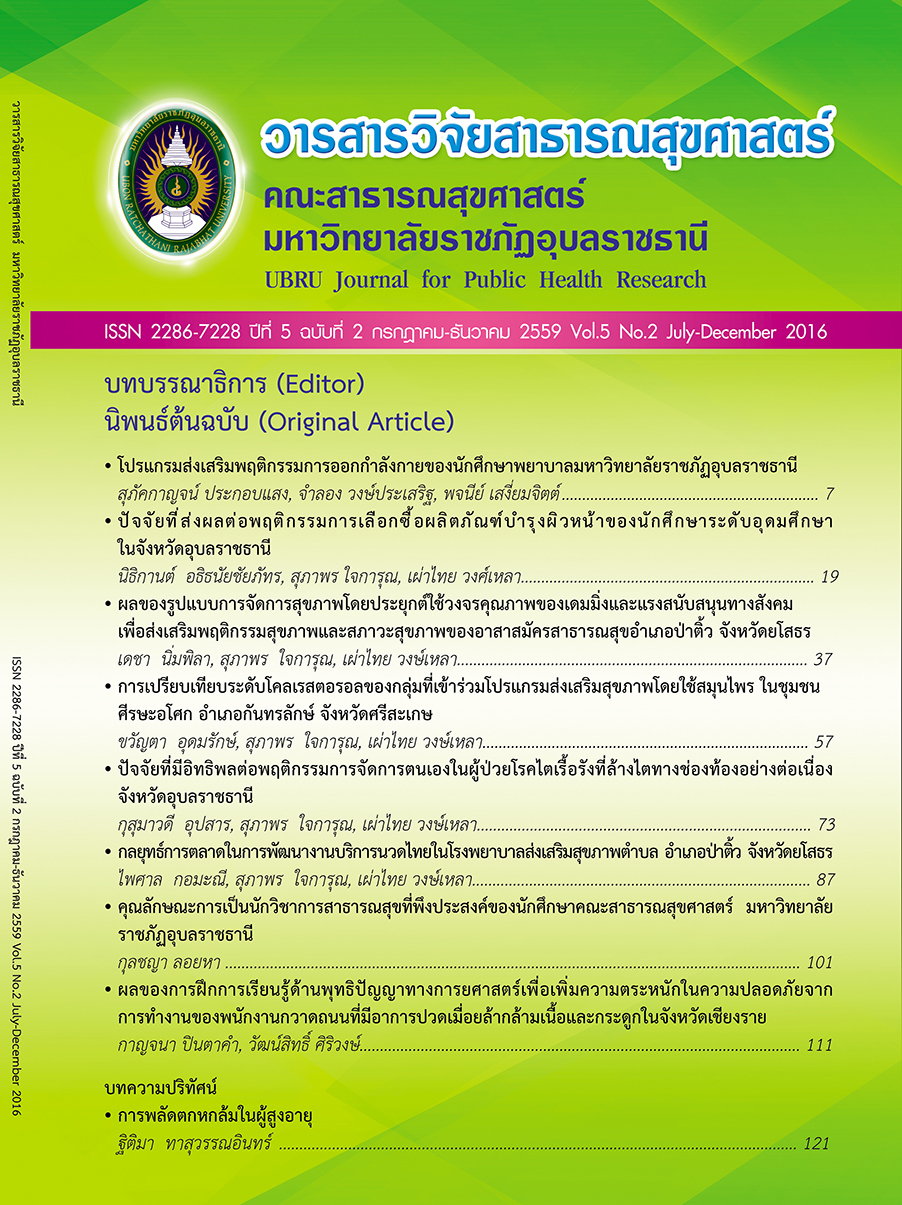A Study of the Effects of the Health Management Model by Applying Demming’s Quality Circle and Social Support to Promote Health Behavior and States of the Public Health Volunteersof Patiew District of Yasothorn Province
Keywords:
Behavioral health management, Model of health management, The quality of the Deming cycleAbstract
Obesity is a chronic disease caused by the many. Cause of illness and the cause of death of the country. Who is involved in all sectors must work together to find solutions to urgent measures. This research was Quasi- experimental study. Aims of this research the effect of variations in health management.The quality of the Deming cycle applications. And social support to promote healthy behaviors. And health status of volunteers at Patiu District, Yasothorn Province. An experimental group was 30 health volunteers aged between 40-60 years, in ChaingPeng Sub-district and comparison group was 35 health volunteers in Khajai Sub-district. By Cluster random sampling. The method of development was 4 level 1) Plan 2) Do 3) Check 4) Action. And data collecting was questionnaires and health records. This data were analyzed using descriptive statistics, percentage, mean and standard deviation. And inferential statistics, including an analysis of covariance (ANCOVA). The results showed that Model of health management The obesity issue of village health volunteers, the researchers prepared. Using the principles of health promotion 3 Rd., Exercise, diet and stress.Theory and social support. Under the Quality Management PDCA (Plan-Do-Check-Act) to the experimental group were managed health behavior change in a matter of proper nutrition, exercise and stress better than before the experiment. The comparison between behavioral health management. And health status after the experiment showed that the experimental group had mean scores than the control group was statistically significant at 0.05 level. In summary, the success factors in the obesity issue in public health volunteers is social support. The promptings encouraging progress. And provide information continuously. Cause a change in behavior management optimum health. And effective.
References
กรมควบคุมโรคสำนักระบาดวิทยา. สรุปรายงานการเฝ้าระวังโรคประจาปี 2553. นนทบุรี : กรมควบคุมโรค, 2553.
กองสุขศึกษา สำนักปลัดกระทรวงสาธารณสุข. สุขภาพคนไทย 2553. นนทบุรี: กองสุขศึกษา, 2553.
กลุ่มงานควบคุมโรคไม่ติดต่อ สำนักงานสาธารณสุขจังหวัดยโสธร. เอกสารสรุปผลการดำเนินงานโรคไม่ติดต่อ ปีงบประมาณ 2553. ยโสธร: กลุ่มงานควบคุมโรคไม่ติดต่อ, 2553.
โรงพยาบาลส่งเสริมสุขภาพตาบลเซซ่ง. สรุปผลการดำเนินงานตรวจคัดกรองสุขภาพประชาชน ตำบลเชียงเพ็ง ปีงบประมาณ 2553.ยโสธร: กลุ่มงานสารสนเทศ, 2553.
สุภัทรา อนันทวรรณ. การส่งเสริมพฤติกรรมการออกกำลังกายของนักเรียนที่มีภาวะน้ำหนักเกิน. วิทยานิพนธ์วิทยาศาสตรมหาบัณฑิต สาธารณสุขศาสตร์ มหาวิทยาลัยมหิดล, 2552.
World Health Organization. 2008-2013 action plan for the global strategic for the prevention and control of noncommunicable diseases. Geneva: World Health Organization; 2009.
World Health Organization. Package of essential noncommunicable (PEN) disease interventions for primary health care in low-resource settings WHO. Geneva: World Health Organization; 2007.
Downloads
Published
How to Cite
Issue
Section
License
เนื้อหาและข้อมูลในบทความที่ลงตีพิมพ์ในวารสารวารสารวิจัยสาธารณสุขศาสตร์ มหาวิทยาลัยราชภัฏอุบลราชธานี ถือเป็นข้อคิดเห็นและความรับผิดชอบของผู้เขียนบทความโดยตรงซึ่งกองบรรณาธิการวารสาร ไม่จำเป็นต้องเห็นด้วย หรือร่วมรับผิดชอบใดๆ
บทความ ข้อมูล เนื้อหา รูปภาพ ฯลฯ ที่ได้รับการตีพิมพ์ในวารสารนี้ ถือเป็นลิขสิทธิ์ของวารสารฯ หากบุคคลหรือหน่วยงานใดต้องการนำทั้งหมดหรือส่วนหนึ่งส่วนใดไปเผยแพร่ต่อหรือเพื่อกระทำการใดๆ จะต้องได้รับอนุญาตเป็นลายลักอักษรณ์จากบรรณาธิการวารสารนี้ก่อนเท่านั้น


